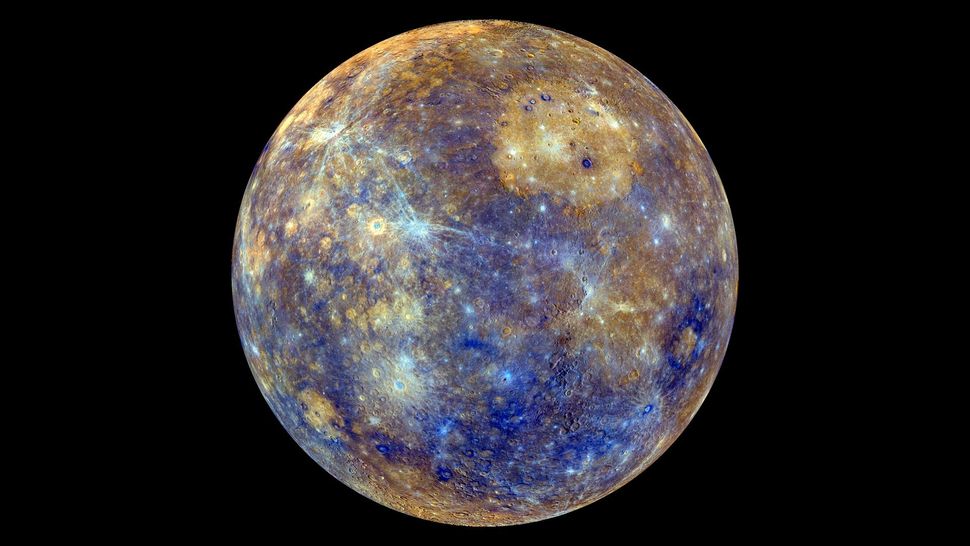Science
Related: About this forumWhat's the Closest Planet to Earth? Not Venus, Scientists Say
What’s the Closest Planet to Earth? Not Venus, Scientists Say
By Yasemin Saplakoglu 11 hours ago

A colorful view of Mercury produced from images taken by the MESSENGER spacecraft.(Image: © NASA/Johns Hopkins University Applied Physics Laboratory/Carnegie Institution of Washington)
What is the closest planet to Earth? The answer most people would give is Venus. But … it might actually be Mercury.
Although Venus is the planet that comes closest to Earth as it sweeps by on its orbit, Mercury stays the closest to Earth the longest, according to a commentary published Tuesday (March 12) in the magazine Physics Today.
"By some phenomenon of carelessness, ambiguity, or groupthink, science popularizers have disseminated information based on a flawed assumption about the average distance between planets," Tom Stockman, a Ph.D. student at the University of Alabama; Gabriel Monroe, a mechanical engineer at the U.S. Army's Engineer Research and Development Center; and Samuel Cordner, a mechanical engineer at NASA wrote in the commentary. [See Photos of Meteorites from Around the World]
When people calculate the distance between two planets, they usually subtract the two planets' average distances from the sun. But here's the thing: That only calculates the distance between two planets when they're closest to each other, they said. Some of the time, Venus is all the way on the opposite side of the Sun because the two planets move at different speeds.A colorful view of Mercury produced from images taken by the MESSENGER spacecraft.(Image: © NASA/Johns Hopkins University Applied Physics Laboratory/Carnegie Institution of Washington)
What is the closest planet to Earth? The answer most people would give is Venus. But … it might actually be Mercury.
More:
https://www.space.com/closest-planet-earth.html?utm_source=notification
tblue37
(65,443 posts)Judi Lynn
(160,582 posts)yonder
(9,668 posts)If you stare at that great photo for just a few seconds, it starts to squib and jump around slightly. And no, I have not started St. Paddy's day early, either.
Judi Lynn
(160,582 posts)yonder
(9,668 posts)underpants
(182,848 posts)🤔
VarryOn
(2,343 posts)Chipper Chat
(9,684 posts)Or drive a new Saturn.
caraher
(6,278 posts)Mercury is the nearest planet to every planet.
What they've really done is pointed out that the question is either somewhat ill-posed or that, out of a misplaced desire to have a firm, single pat answer to the question, too many people simply ignore the fact that the nearest planet changes. Sometimes Venus, sometimes Mercury, sometimes Mars... (I don't think it can ever be Jupiter because Jupiter's orbit is so large; that holds even more strongly for the other planets)
Igel
(35,323 posts)It's a conversational implicature sort of thing.
Not usually "which planet at this moment is closest to Earth?" or "which planet is, on average, closest to Earth?"
muriel_volestrangler
(101,326 posts)the last 10 minutes or so of this "More or Less" programme: https://www.bbc.co.uk/sounds/play/m0001y9p
And, as it happens, I had just had to work this out myself, so I took data from NASA's Horizons webpage, which can give you distances for any date between Earth and just about anything (planets, asteroids, space probes ...).
Who knew I could have got a paper in a publication out of it?
I think the easiest way to explain the result is to think of it with the outer planet 'fixed', and the inner one moving. When the planets and Sun are in line, the distances with the inner planet on the far side of the Sun and the near side will average out to the distance of the outer planet to the Sun. So the main thing determining the separation is the distance of the outer planet from the Sun.
However, the inner planet spends some time more 'to the side', when it will be, on average, a bit more than the outer-planet-Sun distance away. The inner planet closest to the Sun won't go so far away from that distance (think when the planets and the Sun form a right angle triangle with the Sun at the right angle - 'outer-planet-Sun' squared plus 'inner-planet-Sun' squared equals 'planet separation' squared so for a given outer planet, increasing the inner-planet-Sun distance increases the planet separation), so it's average stays smaller.